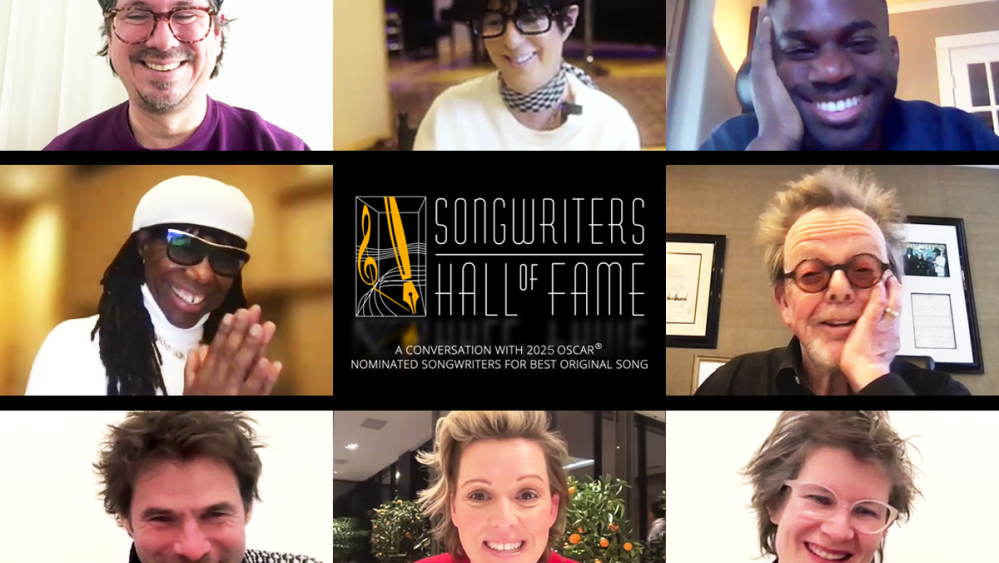The 2025 Academy Awards have sparked a significant conversation among songwriters and music enthusiasts alike, particularly after the Academy’s decision to eliminate live performances of the nominated original songs from this year’s telecast. In response to this decision, the Songwriters Hall of Fame (SHOF) hosted a virtual discussion featuring the creators of the five nominated songs. The panel, co-hosted by SHOF Chairman Nile Rodgers and Oscar-winning songwriter Paul Williams, brought together Abraham Alexander, Adrian Quesada, Brandi Carlile, Clément Ducol, Camille, and the legendary Diane Warren to discuss their inspirations, the stories behind their songs, and their thoughts on the Academy’s controversial choice.
The hour-long conversation, now available on the SHOF website, provided a platform for the nominees to delve into the creative processes behind their work. The discussion also highlighted the emotional and professional significance of having their songs performed live on the Oscars stage—a tradition that has been a cornerstone of the ceremony for decades. While the Academy has stated that it will still acknowledge the Best Original Song category through pre-recorded segments, the absence of live performances has been met with disappointment and frustration from both the nominees and fans. For many, the Oscars represent a rare opportunity to showcase the power of music on a global stage, and the removal of these performances has been seen as a disservice to the art form and its creators.
Brandi Carlile, who co-wrote “Never Too Late” for the Elton John documentary Elton John: Never Too Late, expressed a mix of emotions about the decision. On one hand, she admits to feeling a sense of relief at not having to endure the pressure of performing live on such a high-profile platform. On the other hand, she deeply mourns the loss of what would have been a once-in-a-lifetime opportunity to share the stage with her idol, Elton John. Carlile’s song was born out of her admiration for John’s resilience and toughness, qualities she admires and aspires to. She shared how the experience of writing the song felt like a childhood dream come true, and the thought of performing it alongside John was something she had fantasized about since her teenage years. The possibility of that moment being lost is, for her, deeply poignant.
Diane Warren, a 16-time nominee and one of the most decorated songwriters in the industry, was outspoken in her criticism of the Academy’s decision. She called the move “extremely disrespectful” to the nominees and the audience, arguing that the songs are integral to the films they accompany and deserve to be heard on the Oscars stage. Warren emphasized the healing power of music and the unique opportunity the ceremony provides for songwriters to connect with a global audience. She also noted that for some nominees, this might be their only chance to have their work showcased in such a way. Warren’s passion for the issue was evident, and her fellow panelists echoed her sentiments, with Adrian Quesada acknowledging the disappointment while also expressing gratitude for the honor of being nominated.
The conversation also delved into the stories behind each of the nominated songs, offering a glimpse into the creative journeys of the songwriters. Abraham Alexander, for example, shared how he and Adrian Quesada were inspired by the emotional weight of the prison drama Sing Sing, using the metaphor of a bird to explore themes of freedom and incarceration. The song, “Like a Bird,” was crafted in just a few days, with the writers focusing on translating the film’s emotional impact into a powerful musical narrative. Similarly, Warren reflected on her song “The Journey” from The Six Triple Eight, a film about the first and only all-Black female battalion in the U.S. Army during World War II. Warren described the song as one of her favorites, drawing parallels between the women’s perseverance and her own experiences of overcoming obstacles in her career. She also praised the film’s star, H.E.R., for her breathtaking vocals, which she likened to those of Whitney Houston.
The discussion also explored the challenges of writing for films with complex and emotionally charged subject matter. Clément Ducol and Camille, who contributed two songs to Emilia Pérez, discussed the difficulties of crafting music that could convey the harsh realities of corruption and self-discovery. Their songs, “El Mal” and “Mi Camino,” were written to reflect the duality of the film’s themes, with the former being a rock opera-inspired critique of corruption and the latter a deeply personal love song about self-acceptance. The songwriters described the long and arduous process of perfecting these tracks, which required multiple iterations and a deep understanding of the film’s emotional core.
In closing, the panelists reflected on the enduring power of music and the importance of storytelling in their craft. Despite the disappointment of the Academy’s decision, they remained hopeful that their work would still resonate with audiences. As Nile Rodgers noted, the Oscars’ choice to eliminate live performances is a loss for viewers who tune in for the magic of these moments. However, the conversation itself served as a testament to the creativity and passion of the songwriters, offering a deeper understanding of the artistry behind the music that defines so many films. While the absence of live performances will undoubtedly be felt, the songs themselves remain a powerful reminder of the impact of music on both cinema and culture.
